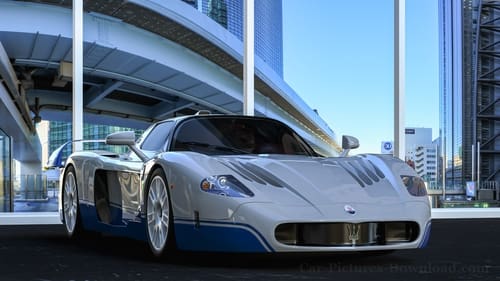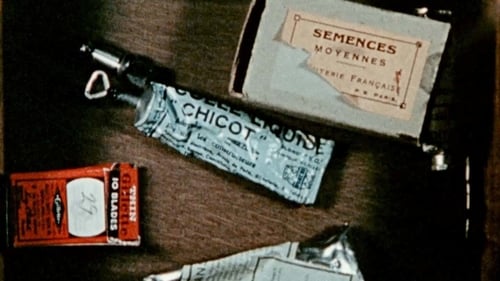OffOn (1968)
Gênero :
Runtime : 9M
Director : Scott Bartlett
Sinopse
The human eye, the human form, the human face: these are the three central images of this avant-garde collage and kaleidoscope of shifting and fractured images, changing colors, and pulsing rhythms. Near the end, a tree appears briefly, and birds fly - first white, then red and blue. Celtic knots morph from one to another. The images become Rorschach tests although the mood, driven by the rapid changing images and the soundtrack, remains frantic.

In the first action he filmed, 6/64 Mama und Papa, Kren’s editing leads to many interlocking continuous shots; central takes recur like a leitmotif, circular motion and networking can be observed throughout the film. Kren painstakingly weaves the fury in front of his camera lens into dense geometrical figures. Shot/countershot sequences alternate, lumping back and forth between single (!) frames, they turn the Actionist turmoil into ornaments, rigid geometrical patterns, the equivalent in time to what Mondrian used to distill on canvas in space. (Peter Tscherkassky)

“A silent perusal of the Grand Canyon, morning to night, from a single, fixed camera position, by means of constant dissolves spaced a few seconds apart. Man — entirely absent — is no longer the center of the universe; the canyon exists outside of him. Despite the invisible photographer and his technologically-caused dissolves, this is a creditable approximation of the true foreign-ness of nature.” — Amos Vogel, Film as a Subversive Art (1974)

A free flow from photography to geometric abstraction hand-painted by Breer. - Harvard Film Archive

An experimental film in which a photograph of an airplane turns into a wire diagram, then into an animated plane in flight, and then it explodes into words.

A series of papers flutter in the wind in this short film by Hollis Frampton.

A series of ghost-like vehicles drive by in this short film by Hollis Frampton.

A butchered cow is decapitated in this short film by Hollis Frampton.

The camera pans across a field of flowers at extreme speeds in this short film by Hollis Frampton.

Further examining the medium of film itself, Colorfilm is a work Lawder made while trying to make a minimalist, "pure color" film. Using spliced-together strips of colored film leader in white, yellow, blue, red, green, etc., Lawder ran the film through a projector and found the results to be quite boring. While he was running the film, though, he noticed how beautiful the colored strips of film looked as they ran through the projector. So, he turned a camera on the projector and filmed the colored film gorgeously winding its way through the projector's machinery." - Noel Black, Colorado Springs Independent

Chronophotograph record of a ball falling through a soap bubble.

Allures is a spectacular sequence of moving figures and points, a film which reaches out to the cosmic and the spiritual, where the spatial dimension becomes transcendental.

A local council worker inspects three homes.

Director Joseph Cornell evokes the nostalgia of childhood by filming a children's party.

"I have not changed the editing structure. I have made the films printable. They are the first known fully collaged films, i.e., films made from found footage, and were done sometime in the ‘40s. Cornell combines Vaudeville jugglers, animal acts, circus performers, children eating and dancing, science demonstrations, mythical excerpts, and crucial freeze-frames of faces into a timeless structure, totally unconcerned with our usual expectations of “montage” or cinematic progression. He collects images and preserves them in some kind of cinematic suspension that is hard – impossible – to describe. But it’s a delight to anyone whose soul has not been squashed by the heavy dictates of Art." —Larry Jordan

A soundless mix of story fragments and images. Initially, images of death, a man with a guitar, a soirée. Some images are surreal: an older woman eats a leaf; a headless man pours a cocktail into his body.

1935 documentary about the hard working life of Welsh coal miners.

Filmed at the Alhambra in Spain in just one day, according to Marie Menken. Arabesque for Kenneth Anger concentrates on visual details found in Moorish architecture and in ancient Spanish tile. The date 1961 refers to the addition of Teiji Ito's soundtrack and its subsequent completion, but the film was likely shot in 1960 or earlier. - David Lewis

Featuring a commentary by Noël Burch (in nonsense French), Recreation's rapid-fire montage of single-frame images of incredible density and intensity has been compared to contemporary Beat poetry.

A short film where circus performers entertain children.

Shot in 1959, Scotch Tape is Jack Smith's first film -- a joyous, three-minute romp, in color, using Peter Duchin's rhumba "Carinhoso" for its soundtrack. Three young men merrily bop through the wreckage of razed buildings at the site of what would become Lincoln Center. Apparently, Scotch Tape was never edited and, instead, was cut in the camera by Smith, combining long shots and close-ups while filming mostly from overhead. The title comes from a small strip of scotch tape that was accidentally stuck on the camera and so is visible in the lower-right corner of the frame throughout the film.





